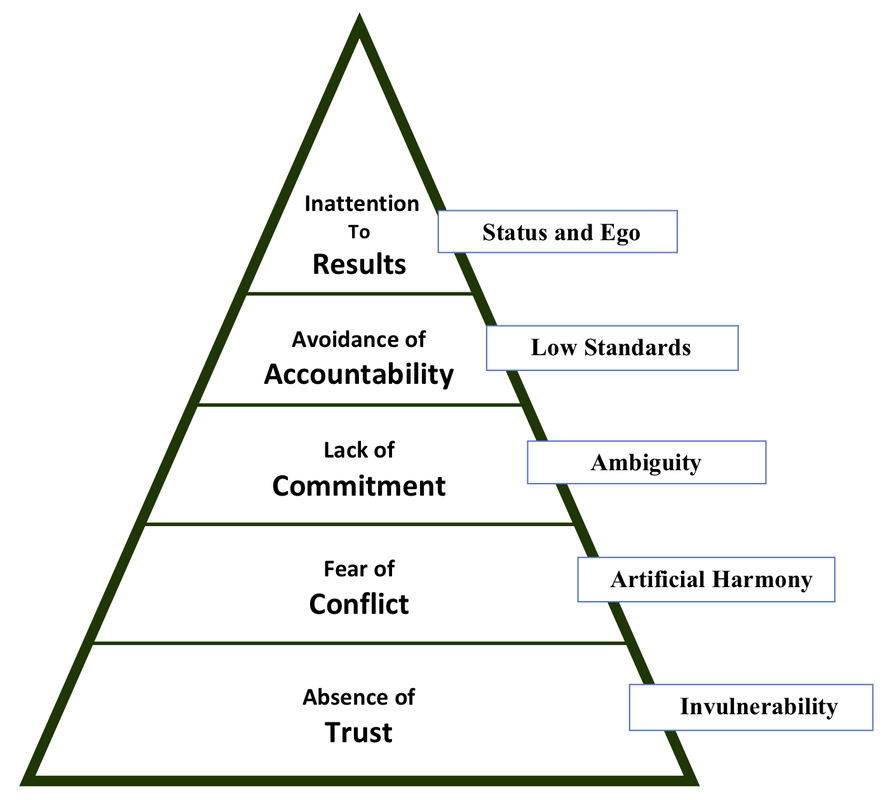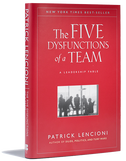|
Article by Jim Jensen... Are accountability and support the same thing? I believe they are. Or at least in the context of effective teaming, they certainly can be. I’ve been using the pyramid model from Patrick Lencioni’s book, The Five Dysfunctions of a Team since the book came out in 2002. The model has become a cornerstone for the work I do with teams. It has helped me to help them get more specific on how to ensure they are functioning effectively and achieving their shared goals. Pyramid Model from The Five Dysfunctions of a Team, by Patrick Lencioni While avoidance of accountability is the fourth of the five behaviors of a dysfunctional team...
...embracing accountability is the fourth behavior of a cohesive team. In the context of teamwork, Lencioni defines accountability as the willingness of team members to call their peers on performance or behaviors that hurt the team, or that seem counterproductive to the good of the team. For those of you who have read the original book and perhaps his more recent book, The Advantage - Why Organizational Health Trumps Everything Else in Business, I’d like to share my spin on accountability. According to Lencioni, even once there is a fairly solid level of trust on a leadership team, and once team members are able to engage in healthy conflict and passionate debate and are thus able to get true commitment and buy-in, holding one another accountable is still incredibly challenging. He says that of all five behaviors it’s the hardest one for teams to embrace, and that getting people to hold one another accountable is by far the most difficult part of forming a cohesive team. Why is holding your peers accountable so difficult? One reason is that peers don’t have position authority over each other. Maybe more importantly though, it can be uncomfortable, especially if it feels like confrontation. If it feels like confrontation it can be uncomfortable even if you do have position authority. My belief is that a simple reframe of what it means to hold a peer or a direct report accountable can have a profound effect, on both parties. So, what is this reframe? It’s directly labeling accountability as support. Support has a significantly different feel than confronting or confrontation. Having a mindset of support makes it more likely that people can provide it (without coming off as accusatory) and more likely that people can receive it (without feeling defensive or small). A team that has a shared understanding of accountability as support is going to adopt accountability as a norm more easily. It will keep the intent in the forefront of people’s minds. In my mind, holding each other accountable means “supporting” each other when things begin to slip. It might be as simple as that. For example, “Pete, you said you were going to ensure that your meetings start and end on time. How’s that going?” Or “Ernesto, you committed to making sure that meeting minutes with action items get dispersed. I’m not sure people are leaving the meetings knowing what they’re supposed to do.” or, “Megan, you said you were going to have a report ready to share at our meeting next Monday. Are you all set with that?” With this mindset of accountability, in a trusting environment, people often appreciate when others hold them accountable. They feel supported. I’d also say that with this mindset, holding someone accountable has nothing to do with being “the bad guy.” It’s more about taking the responsible risk to be “the good guy.” If what I’ve said so far resonates with you, might it make sense to have a discussion around this definition of accountability with your team? Of course, the discussion would be more fruitful if your team members had a solid understanding of the entire pyramid model, but having a shared definition of accountability can help people to be cognizant of their own intent; it can also help you be more aware of the intent of others as they are trying to figure out how to support you. The benefits of living in a team environment where "accountability support" is the norm are many. When a team gets good at having the “accountability discussions”, exploration that could lead to innovative thinking, re-ranking of priorities, or getting team members support they need is more likely to happen. Basically then, team members are not left to struggle on their own. I hope you found this helpful. With a home base in Michigan, we provide leadership team development and team building programs, and organizational culture and consulting services worldwide. A version of this blog post first appeared in Crux Move Consulting’s blog Dynamic Teams: Leadership Team Building. Building healthy culture by building healthy leadership teams Your comment will be posted after it is approved.
Leave a Reply. |
AuthorJim Jensen, MA LPC is the Principal and Founder of Dynamic Teams LLC, specializing in helping leaders of companies build healthy culture through dynamic leadership teams. Archives
March 2022
Categories |




 RSS Feed
RSS Feed


1/6/2019
0 Comments